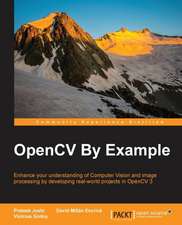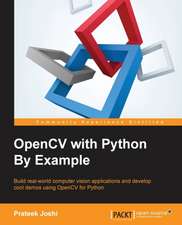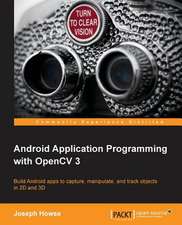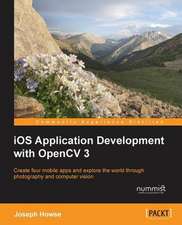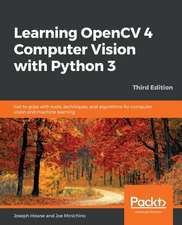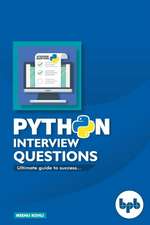OpenCV Computer Vision Projects with Python
Autor Michael Beyeler, Prateek Joshi, Joseph Howseen Limba Engleză Paperback – 31 ian 2017
Key Features
- Use OpenCV's Python bindings to capture video, manipulate images, and track objects
- Learn about the different functions of OpenCV and their actual implementations.
- Develop a series of intermediate to advanced projects using OpenCV and Python
OpenCV is a state-of-art computer vision library that allows a great variety of image and video processing operations. OpenCV for Python enables us to run computer vision algorithms in real time. This learning path proposes to teach the following topics. First, we will learn how to get started with OpenCV and OpenCV3's Python API, and develop a computer vision application that tracks body parts. Then, we will build amazing intermediate-level computer vision applications such as making an object disappear from an image, identifying different shapes, reconstructing a 3D map from images, and building an augmented reality application, Finally, we'll move to more advanced projects such as hand gesture recognition, tracking visually salient objects, as well as recognizing traffic signs and emotions on faces using support vector machines and multi-layer perceptrons respectively.
This Learning Path combines some of the best that Packt has to offer in one complete, curated package. It includes content from the following Packt products:
- OpenCV Computer Vision with Python by Joseph Howse
- OpenCV with Python By Example by Prateek Joshi
- OpenCV with Python Blueprints by Michael Beyeler
- Install OpenCV and related software such as Python, NumPy, SciPy, OpenNI, and SensorKinect - all on Windows, Mac or Ubuntu
- Apply "curves" and other color transformations to simulate the look of old photos, movies, or video games
- Apply geometric transformations to images, perform image filtering, and convert an image into a cartoon-like image
- Recognize hand gestures in real time and perform hand-shape analysis based on the output of a Microsoft Kinect sensor
- Reconstruct a 3D real-world scene from 2D camera motion and common camera reprojection techniques
- Detect and recognize street signs using a cascade classifier and support vector machines (SVMs)
- Identify emotional expressions in human faces using convolutional neural networks (CNNs) and SVMs
- Strengthen your OpenCV2 skills and learn how to use new OpenCV3 features
Preț: 447.12 lei
Preț vechi: 558.90 lei
-20% Nou
Puncte Express: 671
Preț estimativ în valută:
85.55€ • 89.33$ • 70.81£
85.55€ • 89.33$ • 70.81£
Carte tipărită la comandă
Livrare economică 05-19 aprilie
Preluare comenzi: 021 569.72.76
Specificații
ISBN-13: 9781787125490
ISBN-10: 1787125491
Pagini: 570
Dimensiuni: 191 x 235 x 31 mm
Greutate: 1.05 kg
Editura: Packt Publishing
ISBN-10: 1787125491
Pagini: 570
Dimensiuni: 191 x 235 x 31 mm
Greutate: 1.05 kg
Editura: Packt Publishing
Notă biografică
Michael Beyeler is a postdoctoral fellow in neuroengineering and data science at the University of Washington, where he is working on computational models of bionic vision in order to improve the perceptual experience of blind patients implanted with a retinal prosthesis (bionic eye).His work lies at the intersection of neuroscience, computer engineering, computer vision, and machine learning. He is also an active contributor to several open source software projects, and has professional programming experience in Python, C/C++, CUDA, MATLAB, and Android. Michael received a PhD in computer science from the University of California, Irvine, and an MSc in biomedical engineering and a BSc in electrical engineering from ETH Zurich, Switzerland.















